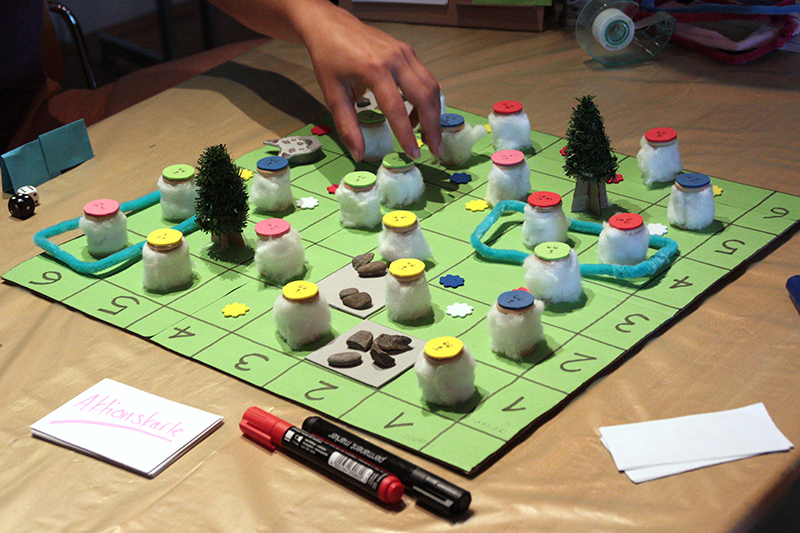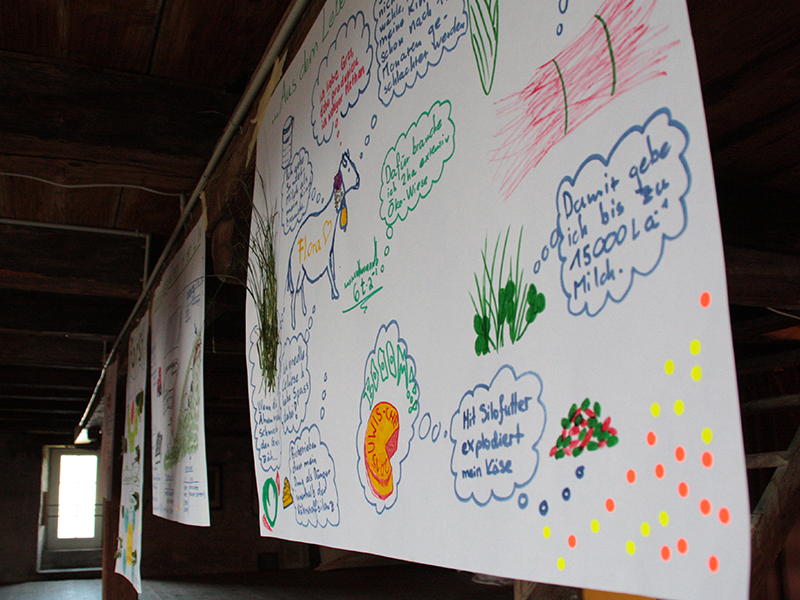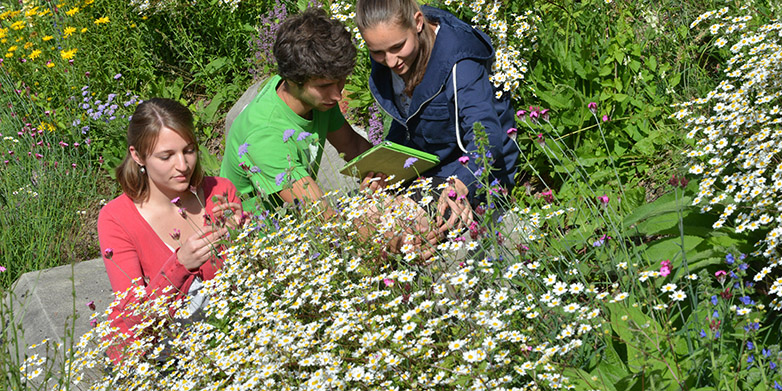Tried, trusted – and up to date
In their fourth semester, students on the ETH Bachelor in Environmental Sciences course discover the joys of integrated practicals – a cornerstone of the programme ever since the Department of Environmental Systems Science was founded.
Who could want more beautiful or inspiring surroundings: here we are in the historic Greifensee Castle, by the captivating blue waters of the eponymous lake, with shimmering white Alps on the horizon. This is where 90 students on the Bachelor of Environmental Sciences course are seeing out the end of their fourth semester with a bang.
For the bachelor students, this semester is truly something special. Between February and the start of June they undertake what are known as integrated practicals (IPs), each lasting three weeks. Students have to do one compulsory practical in microbiology but can choose which IPs they want to do for the other three blocks. It’s an intensive period for them and one in which there are hardly any lectures for them to attend.
Established teaching tool
Integrated practicals have been part of the programme since the Department of Environmental Systems Science was founded in 1987. But in recent years the whole concept has been fundamentally reworked under the current IP heads: Angelika Hilbeck, a lecturer and researcher at ETH Zurich’s Institute of Integrative Biology, and Bernadette Oehen of the Research Institute of Organic Agriculture (FibL).
Previously, the primary purpose of the practicals was to drum into students’ heads the field methods used in biology, soil science and climatology. Now, teachers present the students with practical problems that are topical and interdisciplinary – which the students then have to solve along transdisciplinary lines. “These practicals serve as the glue that binds the first three semesters, bringing together disciplines that have up to that point been dealt with separately,” explains Hilbeck. They require students to integrate their knowledge of various disciplines and – more importantly – apply that knowledge.
Topics of burning interest
Current practicals include one devoted to urban food, one on the risks associated with genetically modified organisms, and one that considers environmental protection and conflict management based around the case of wolves in Switzerland. Another new block focuses on urban ecology, while the remaining practicals are of the more “classical” variety.
“My practical embodies the new IP philosophy in that it deals with a contemporary topic: urban ecology,” says IP lecturer Christoph Küffer. This practical sees students integrating data from the natural and social sciences to work up a practical proposal with specific solutions by the end of the block. In order to come up with solutions they must harness methods from biology, environmental protection, psychology, management and marketing.
Transdisciplinarity with a capital “T”

At ETH Zurich, integrated practicals are a Department of Environmental Systems Science speciality, and Hilbeck has been responsible for them as coordinator for the past five years. Practicals are given not only by ETH professors and lecturers but also by specialist experts from forestry or agricultural offices, from NGOs or from Agroscope, the Swiss federal research centre for agriculture, nutrition and the environment.
Students’ evaluations of the integrated practicals, and of the end-of-semester celebration, are as overwhelmingly positive as ever. Hilbeck sees this as a validation of her efforts to keep the programme up to date and introduce more elements from the field of urban living: “In fact, almost as soon as we announced the urban workshops, every last place had been booked!” She is sure it has something to do with the fact that “the majority of today’s students have an urban background.”
Building up new topics
Plans are afoot to revise the concept for next year. Nothing has been finalised as yet, but Hilbeck is considering applying for assistance from the ETH Educational Development and Technology unit’s Innovedum fund. She is planning to work up completely new topics, which means she will also need new lecturers. But she knows that finding them and training them up will take time and require more capacity. What’s more, students of agricultural sciences are also interested in the integrated practicals but “we haven’t had enough space to include them,” she says.
Major learning effect

Hilbeck is convinced that the learning effect of IPs is considerable: “These practicals teach students lots of new things, while giving them a chance to apply and build on what they’ve learned in lectures.” In the soil science IP, for example, students are tasked with finding out how long it takes a herbicide to break down in a particular type of soil – a tough assignment for anyone with no relevant prior knowledge. “Students have to be able to access their knowledge on demand. If there are any gaps, then they know it’s time to pore over their lecture notes again,” Hilbeck says.
But the IPs aren’t all about brainwork. They also serve up practical expertise from forestry and agriculture. “Each year we take students into the forest, where they watch a woodsman chop down a really big tree – and more importantly, they learn why we do that,” Hilbeck says. “That’s an experience that really stays with them.”
Peter Frischknecht, environmental systems science study programme coordinator, sees things the same way: “The IPs are led by lecturers who know how to truly inspire their students and who thoroughly enjoy teaching in a way that integrates various disciplines. And we’re doing everything we can to make sure things stay that way.”
Students like the approach
The students themselves also give the IPs top marks. “I thought the practicals were fantastic,” says one student, remarking that it was obvious the lecturers were really motivated. “It was just great to get out of the lecture theatre,” she adds.
One of her fellow students stresses the value of working in small groups: “I loved the fact that we weren’t expected to just sit there and listen,” she says. “Instead we got to collaborate with other people to prepare the project and then really plunge into the work to get it done.”
Another bonus is that the celebration to mark the end of the IPs brings all the fourth-semester students together – the only time they have such an opportunity. “It’s great that we all get to know each other,” the student adds. The idea for the celebration can be traced back to a student initiative in the mid-’90s. Back then, the event was organised and managed by the students themselves, Frischknecht stresses. It was only when diploma studies gave way to the bachelor-master system that this self-management element disappeared.
But the celebration lives on, and with good reason: after all, it too is very beneficial for students. “Participants simply don’t have a similar opportunity to build up a big network for themselves either before or after this event,” says Hilbeck. “That’s what gives it such lasting value.”

